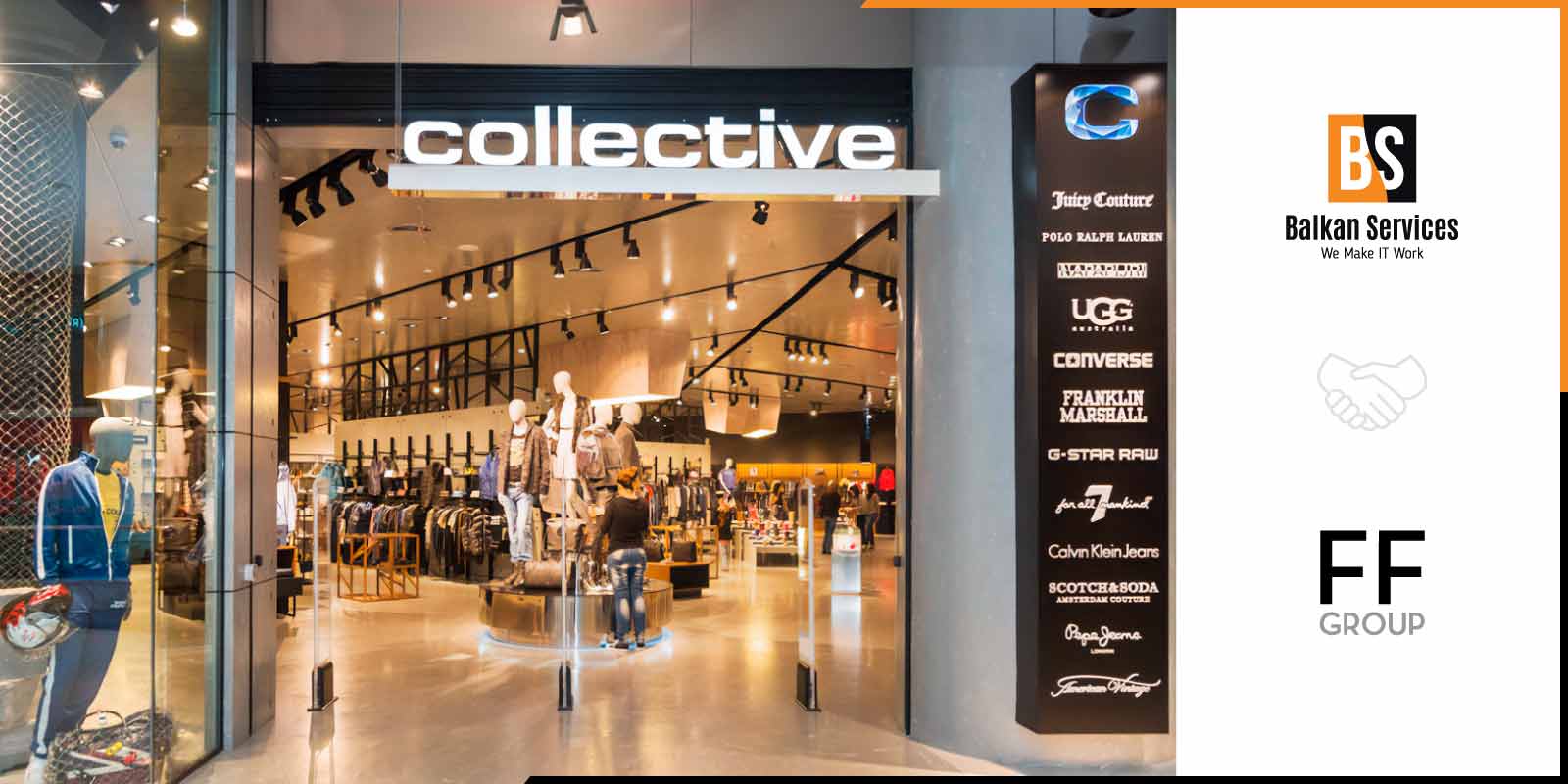Contact information.
-
Address"Ekzarh Yosif" street, 31, 1000 Sofia, Bulgaria
-
Phone:+359 2 980 95 99
-
Websitewww.balkanservices.com

Is it possible to increase your business potential by over 100%? FF Group Bulgaria’s experience shows that this is an achievable goal. You will find out what we mean in the following lines.
FF Group Bulgaria is a fashion retailer with over 150 employees nationwide and 15 physical outlets. The company develops the Collective brand and in the six physical stores of Collective, which are located in malls in the 4 largest Bulgarian cities and the online store of the company can be found the latest collections of world-famous brands such as Emporio Armani, A | X, Karl Lagerfeld, Boss, Hugo, John Richmond, Love Moschino, Tommy Hilfiger, Chiara Ferragni and many others.
History shows that in business, as in life, the fittest survive. After the pandemic shut down the entire economy, along with all the shopping malls in the country, online commerce proved to be one of the few options companies had for doing business. It was during the first lockdown that FF Group Bulgaria set about optimizing its online presence.
The action was taken back in 2020 when it was imperative to take swift action. Subsequently, it turned out that many things needed to be optimized to fulfill online orders faster, more rigorously, and have better accountability.
“Realistically, we were then using our physical stores as warehouses, and the ERP system implemented by Balkan Services was linked to nine stores, which were nine separate warehouses between which goods were searched. This was making the process very labor intensive and time-consuming,” explains Chandra Chakravardaya, Online Store Manager, Collective, about the need to automate the online ordering process.
This process used to take a minimum of three days from the time the order was received till it was sent to the customer.
However, this was not the main problem.
“Several times, when we ordered an item from a store, we would realize the next day that that item was already sold out or unavailable for some reason – it was either scrapped or had been reserved for a customer of the physical store,” recalls Chandra Chakravardaya.
The confluence of time, availability, and quick delivery factors led to the need for integration with a separate warehouse to be used specifically for the online store orders. It is to be independent of the physical stores and have merchandise that would only secure the online distribution channel.
Thus, the quite expected decision was made to outsource the service and execution of online orders to a company that specializes in offering this type of service, with a good warehouse infrastructure and a sufficient team of employees.
The decision entailed the need to integrate the ERP system of FF Group Bulgaria with the warehouse software of the company subcontracted for the online orders. This placed the ERP system at the center of the architecture, communicating data with the online platform on the one hand, and with the WMS system of the warehouse fulfilling the online orders on the other.
The upcoming integration brought to the forefront the need to review the existing way of working and the underlying logic of the system behavior, also highlighting opportunities for optimization.
This in turn necessitated the design of a completely new architecture in the processes of the ERP system to ensure the connection with the warehouse software of the subcontractor chosen to prepare and ship the online orders, as well as a change in the already established integration between the ERP system and the e-commerce platform (Magento).
Our team is here to listen carefully and offer the right solution for you.

Over the years, Balkan Services has successfully completed projects with FF Group Bulgaria for the implementation of ERP software and a business intelligence (BI) system. As long-standing business partners, FF Group Bulgaria decided to trust our team for the solution architecture and process concept.
“During our first meeting about the project, Balkan Services and I had to specify what we needed to do to upgrade the system most correctly and optimally,” says the online store manager.
According to him, a big help from our team was to show him how an online store should be integrated with different platforms, which helped to clarify expectations.
“Your team channeled my vision in the right direction to clarify the requirements and plan the implementation of the project,” he says.
This is how we got to the implementation of the project, which took about two and a half months. During the implementation, Chandra Chakravardhaya was responsible for coordinating four teams – FF Group, Balkan Services, the fulfillment partner, and the company that developed and maintains the online store.
“The biggest challenge was to coordinate a complex assignment between several companies responsible and involved in the implementation of this project,” notes Hristo Kostadinov, Project Manager at Balkan Services.
He adds that Chandra Chakravardhaya has a lot to contribute to the project.
“Without his willingness and dedication, things would not have turned out so well. He not only assisted at every step and was actively involved in the project, but was also aware of the details that had to be agreed between the parties,” says Hristo Kostadinov.
During the discussions around the ERP system upgrade, the Balkan Services team also had a very close relationship with the consultants who were on the e-shop side and with the programmers who set up the warehouse software that fulfilled the orders.
“During the process of this integration, we had regular meetings to coordinate the progress of the project. We were moving quite rhythmically and thanks to the other teams being ‘tight’ and completing the tasks as we agreed them and as we got along, things were happening at a very good pace,” sums up Hristo Kostadinov.
The goal of the project was to optimize this distribution channel through the integration between ERP, online store, and warehouse software to support faster and higher quality service of online orders.
The direction that FF Group Bulgaria is taking is to outsource the entire service of its online store to a dedicated warehouse and thus ensure that all orders that come in can be processed and fulfilled within the same day.
This in turn is challenging because orders have to enter the software of that warehouse and be processed. The statuses change for these orders, and this needs to be reflected in the ERP system to know what is happening with each order. The whole process of servicing and posting the orders is done in the ERP system.
The ERP software itself in turn depends on information that needs to be fed from the warehouse software to run an order. What’s more, it’s not just this new warehouse that is challenged when securing this process.
“We had to go back and address the other platform that was already integrated with the ERP system – that is the online store itself because the new service process also necessitated a redesign of the integration between these two systems,” explains Hristo Kostadinov.
According to him, behind the ERP system “lie” many processes that are set up so that things happen automatically, without human intervention of operators, which was very important for the customer.
For the complete service of an online order, our team defined 15 statuses, each of them triggering a specific process.
“These 15 statuses were the most valuable in terms of automating the process. They are the basis for the logic of automated communication to the user – to know what is happening with their order, to receive emails with information – about where the order is, whether it has been handed over to a courier, whether it is traveling and when it will be delivered,” says Hristo Kostadinov.
And adds that all the automation on the emailing is defined through the ERP system and statuses.
In addition to the project itself, our team also had to develop a new suite of reports to help control the process, as FF Group Bulgaria outsourced an entire distribution channel – it has now been outsourced to an external warehouse.
“To have control over the process and to take timely measures, we had to secure the functionalities in the ERP system in such a way as to provide these reports with data that would give a very good picture and control over the traceability of orders at any given moment,” explains Hristo Kostadinov.
Among the processes our team is working on for this integration project are:
Throughout the project, a lot of time has been spent on what Collective’s customers will get as an experience from their purchase.
“We have improved customer service and it is a fact that we are now getting very few calls and emails – one or two a day at the most, in comparison, before the phone would not stop ringing and emails were 50 a day,” says Chandra Chakravardhaya.
He adds that the user experience is 101% better thanks to the project, which is confirmed by the positive customer feedback.
“Now the calls are no longer about complaints, but generally customers asking which physical store they can see an item that is available online. There have been days when I haven’t even received an email,” says Chandra Chakravardhaya, sharing the results of the project implementation.
Another important effect of the change is that the delivery of the products takes just one day. If the order is cash on delivery and is received by two and a half hours after noon, it is fulfilled the same day and the items are with the customer the next day.
Automating the online order process frees up time for the store team to focus on overall performance – improving the e-store and user experience, planning additional marketing campaigns, etc.
Previously, two people were 110% fully engaged with ordering clothes from stores, receiving them, and shipping them, and realistically neither of the two of them could do anything other than order, package, and ship clothes. Now the work process is much easier,” sums up Chandra Chakravardaya.
The immediate effect of the upgraded ERP system was felt the very first time orders received after the Christmas and New Year holidays had to be fulfilled. Then 95% of the orders were fulfilled on the second working day, which was five times faster than before.
Through the new workflow, the team in charge of the online store optimized all their working time and now has the resources to think about further optimizations and development of both the online store and the ERP system.
“We continue to hear from the Balkan Services team about some details – about issuing documents, for example. I hope to start work on the redesign of the e-shop within two months,” he says.
Chandra Chakravardhaya describes our work together as a path where the right partner leads you in the right direction
“In the end, when you turn around and see where you have started from, what you have gone through, and what you have achieved – that is the greatest satisfaction you can have. The right partner helps you realize where you could have gone wrong so you don’t go wrong in the future,” the Collective online store manager concludes.
At Balkan Services we have expert knowledge of business, technology, and legislation, and we speak all three languages. We will listen carefully and advise you on choosing the right business system for your needs.
Balkan Services has been implementing business software solutions since 2006 and has completed more than 690 projects for over 360 clients. We follow a proven implementation methodology with clear steps and best practice know-how.